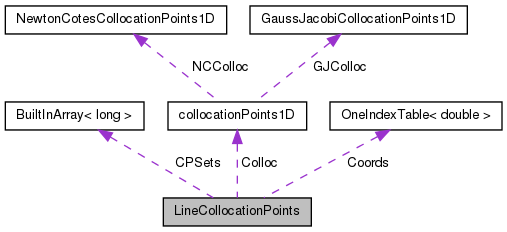Public Member Functions |
|
| LineCollocationPoints () |
| | Default constructor.
|
| | LineCollocationPoints (LineCollocationPoints &Instance) |
| | Copy-initializer constructor.
|
|
| ~LineCollocationPoints () |
| | Class destructor.
|
| LineCollocationPoints & | operator= (LineCollocationPoints &Instance) |
| | Copies the contents of instance to the object.
|
| void | SetMaxPolyOrder (unsigned long MaxOrder) |
| | Sets the maximum polynomial order for the line collocation points.
|
| unsigned long | GetMaxPolyOrder () |
| | Returns the maximum polynomial order for the line collocation points.
|
| long | GetCollocationPointsSetNumber (unsigned long PolyOrder) |
| | Returns the set number of the collocation points for the given polynomial order.
|
| unsigned long | GetTotalNumberCollocationPoints () |
| | Returns the total number of collocation points.
|
| unsigned long | GetNumberCollocationPoints (unsigned long PolyOrder, long &CollocationPointsSetNumber) |
| | Returns the number of collocation points for the given polynomial order and the collocation point set where they are stored.
|
| unsigned long | GetNumberCollocationPointsSets () |
| | Returns the number of collocation points sets stored in the class.
|
| double *const | GetCollocationPointsCoords (unsigned long PolyOrder, unsigned long &NumberPoints) |
| | Returns the line collocation points for the given polynomial order.
|
| void | RunCollocationPointsCoords (collocationPointsAttributes_S &CPAttributes, BuiltInArray< unsigned long > &PolyOrder) |
| | Calculates the line collocation points coordinates.
|
|
void | Convert2NaturalCoordinates () |
| | Converts the coordinates from the interval [-1,1] to [0,1].
|
|
void | Convert2LocalCoordinates () |
| | Converts the coordinates from the interval [0,1] to [-1,1].
|
| void | Print (FILE *File) |
| | Prints the line collocation coordinates in the given ascii file.
|
Protected Attributes |
|
collocationPoints1D | Colloc |
| | Instance of the collocationPoints1D to calculate the 1D collocation points coordinates.
|
|
OneIndexTable< double > | Coords |
| | Table that stores the collocation points coordinates.
|
|
unsigned long | Pmax |
| | Maximum polynomial order.
|
|
unsigned long | NumbCPSets |
| | Number of sets of collocation points used.
|
|
BuiltInArray< long > | CPSets |
| | This array has size for the maximum number of collocatiotion points, which it is calculated as Pmax + 1. The array stores for each number of points, the row number of the tables of coords storing the points. As the array is allocated for the maximum number of points, some positions may not be used. In this case, this array will store -1.
|
Calculates the collocation points coordinates for the line element.
- Author:
- Fabiano Fernandes Bargos/Marco Lcio Bittencourt
- Date:
- March/15/2011

 1.7.6.1
1.7.6.1